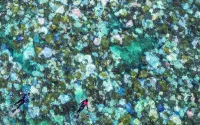4 April 2007The Independent
More than half of the tropical coral reefs in the world where governments collect data on fishing levels are being degraded beyond repair, according to a global survey of reef fisheries.
The findings suggest that it would take an additional area of tropical coral four times the size of the Great Barrier Reef - the biggest reef system in the world - to sustain current fishing levels.
If the commercial exploitation of tropical corals continues at present rates, many reefs will be irreversibly degraded and millions of people will have to look for other sources of food, scientists said. "Millions of people are dependent on coral reef fisheries. We are facing a global crisis among communities which have limited alternative livelihoods or major food sources," said Katie Newton of the University of East Anglia in Norwich.
"We're facing a food-security crisis - 30 million people on the planet depend entirely on coral reefs for their income and for their food," Ms Newton said.
The study found that 55 per cent of the 49 island nations who register their fish catch are fishing unsustainably by taking more fish, molluscs and crustaceans than the reefs are able to replace.
The scientists estimated that the amount of fish being caught on tropical coral reefs is currently 64 per higher than can be reasonably sustained. This means that it would require an additional area of tropical coral amounting to 75,000 sq km - 3.7 times the size of the Great Barrier Reef - to make current fishing levels sustainable, the scientists said.
By 2050, population growth would triple the fishing pressures, yet coral reefs will continue to suffer from other threats, notably pollution and global warming.
The study, published in the online journal Current Biology, suggests that the threat to tropical corals will lead to many inhabited island atolls being abandoned during the 21st century.
Nick Dulvy, of the Centre for Environment, Fisheries and Aquaculture in Lowestoft, said exploitation of coral fisheries would cause social and economic hardship. "Alternative livelihoods will be essential for many of those currently dependent on coral reef fisheries," he said.
It is estimated that 284,300 sq km of tropical coral exist globally and that about 20 per cent have been irreversibly lost in recent decades. Another 26 per cent is at risk. Small-scale fishing can be sustainable but population growth and the spread of unsustainable methods of fishing - such as the use of dynamite - is damaging many reefs beyond repair.
"Once [large fish] are removed, you get various cascade effects such as a proliferation in sea urchins, which are indiscriminate grazers," Ms Newton said.






